LEWISTON — Donna Wall sprinted into the night, newspaper in hand and pointy elbows flapping at right angles from her sides. She made her way to the back porch of one of the 160 customers on her delivery route.
It was 2 a.m. on a weekday in October, but it could be any day of the year, as Wall’s only day off is Christmas.
She slipped back into her red Nissan Versa – Sly and the Family Stone playing on the car radio – and laughed ruefully. She wore a blue and white football jersey that said “Meet Me in the Tropics.” Did she get her shirt on a cruise?
“Ha! I wish,” Wall said as she put her car in park, grabbed another Sun Journal and ran into an apartment complex.
Wall is one of about 70,000 Mainers who stand to benefit from Medicaid expansion, which is on the Nov. 7 ballot.
Conservatives like Republican Gov. Paul LePage are steadfastly against Medicaid expansion, while liberals and all major health care groups, such as groups representing hospitals, doctors and nurses, are arguing in favor of expansion.
The vote matters personally for people in Wall’s circumstances.
Wall, 60, is uninsured, and she worries about how long she can keep doing what she’s doing before she falls ill.
“I work nonstop. That’s all I do. I don’t have a life. I don’t hardly even have adult conversations,” said Wall, who lives nearby in a modest apartment.
Wall took the overnight job – if she runs she can finish it in three hours, although snow and rain can make it take up to five hours – because she needed the extra money.
A single mother, Wall takes care of three adult autistic children. Her 18-year-old twin boys are nonverbal and have the intellectual development of toddlers. Her 21-year-old daughter is high-functioning but still developmentally disabled.
The Nov. 7 vote asks whether taxpayers should take care of low-income Mainers who need health insurance.
PAST EXPANSION BILLS VETOED
The liberal advocacy group Maine Equal Justice Partners gathered voter signatures to put the question on the ballot after expansion bills passed by the Legislature had been vetoed five times by LePage.
Brent Littlefield, LePage’s political adviser and a spokesman for the Welfare to Work PAC that opposes Medicaid expansion, pointed to Maine’s history of expanding Medicaid in the 2000s as a reason not to accept the federal money to do so this time.
“We already tried this experiment. Our argument is that this experiment failed,” Littlefield said, pointing to state budget problems caused by Medicaid cost overruns. “The results were disastrous. The uninsured percentage hardly budged despite massive amounts of additional spending.”
But Ann Woloson, public policy director for Maine Equal Justice Partners, said with the federal government footing 90 percent or more of the bill for the expansion, it’s a “good deal” for Maine.
“This is more than providing health care coverage to people in the gaps. This will improve the Maine economy. It’s going to create good-paying jobs,” she said.
Woloson agreed that Maine’s uninsured rate stayed relatively the same in the 2000s and early 2010s, but she pointed out that at the same time, in most other states the uninsured rate was increasing because employers were dropping coverage as health care costs increased and the recession hit.
The Medicaid question comes on the heels of dramatic votes on efforts to repeal the Affordable Care Act in the U.S. Senate – with moderate Maine Republican Sen. Susan Collins casting a decisive “no” vote – and a near-vote in September when Collins’ opposition was again crucial.
Last week, the Trump administration took additional steps to undermine the ACA’s individual marketplace, including cutting back on subsidy payments to insurance companies and setting the wheels in motion to create a separate insurance market that health experts say would weaken the ACA.
WHO ARE THE 70,000?
The 70,000 people who would directly benefit from an expansion of Medicaid, called MaineCare here, are residents who earn between 0 and 138 percent of the federal poverty limit, about $28,000 for a family of three.
Many of these people previously had Medicaid coverage, under an expansion that took place in 2002. But LePage scaled back the program after he won the gubernatorial election and took office in 2011. The 2002 expansion provided health care coverage to parents earning up to 200 percent of the federal poverty level and 100 percent for childless adults.
Total Medicaid enrollment has declined from 356,000 in 2011 to 268,000 in 2017, according to the Maine Department of Health and Human Services. About 36,000 people lost eligibility under LePage’s cuts – including childless adults and parents with minor children who earned between 100 and 200 percent of the poverty level.
EXPANDED IN 31 STATES
Medicaid is a federal program operated by the states that’s funded with a blend of state and federal dollars. In Maine, about two-thirds of the funding comes from the federal government, and the state kicks in the rest for the $2.6 billion program.
Nationally, Medicaid expansion was a cornerstone of the ACA. In response to a legal challenge, the U.S. Supreme Court ruled that Congress cannot require states to expand, but for those who chose to do so, the federal government pays for 90 percent or more of the cost for at least the first three years. So far, 31 states have expanded Medicaid, and Maine may become the next state to do so if the referendum passes.
It’s difficult to determine how many of the 70,000 who would be eligible for Medicaid expansion earn less than 100 percent of the federal poverty level, Woloson said, but it’s safe to say it’s in the tens of thousands.
Wall lost her insurance coverage after her twin boys turned 18. In the eyes of the program, she was a childless adult and no longer eligible for MaineCare.
“I still take care of them just as much, if not more, than I did two years ago and when they were little,” she said.
Wall earns about $7,000 a year from her newspaper route. The $700 a month she receives from Social Security for her children’s disabilities bumps her annual income to about $17,000 to $18,000.
Wall falls into a coverage gap where she doesn’t qualify for Medicaid coverage and also is not eligible for subsidies to obtain Affordable Care Act marketplace insurance. She would need to make $24,600 to qualify for ACA subsidies.
And she’s not yet old enough for Medicare, which kicks in at age 65.
Wall said she works nearly around the clock and yet can’t afford to see the doctor. She’s put off some chronic health problems, forgoing needed checkups for her eyes. She had to discontinue counseling and the antidepressants she was taking when she was dropped off Medicaid a few years ago.
And she worries that if she is injured in a fall at work she would plummet into bankruptcy. Last winter, she fell hard on her tailbone, but it didn’t cause any medical problems other than soreness.
SUPREME COURT STEPPED IN
The ACA was designed to have Medicaid expansion mandatory in all states. That would have provided coverage to those earning up to 138 percent of the poverty level, at which point ACA marketplace coverage would take over. That way, Medicaid or subsidized insurance would be available to everyone from 0 to 400 percent of the poverty limit.
But the Supreme Court made Medicaid expansion voluntary, and Maine is one of 19 states that have refused expansion.
The uninsured rate declined an average of 48 percent in expansion states and 28 percent in nonexpansion states from 2013 to 2016, according to a 2017 Gallup poll. Maine’s uninsured rate dropped from 16 percent in 2013 to 9 percent in 2016.
MANY FALL INTO COVERAGE GAPS
In nonexpansion states, the poorest residents fall into an unusual category that was a byproduct of the Supreme Court decision.
If they earn less than 100 percent of the poverty limit, they make too little to qualify for ACA subsidies that make coverage affordable. A plan that would cost $200-$300 in monthly premiums for someone making 98 percent of the poverty limit would drop to about $10-$20 a month for someone earning just over the poverty limit, depending on the plan chosen.
According to the Kaiser Family Foundation – a nonpartisan Washington think tank – about 21,000 of the 80,000 people who have ACA marketplace coverage in Maine earn between 100 and 150 percent of the poverty limit. Most of the remaining 59,000 earn 151 percent to 400 percent, where the subsidies end.
Since the expansion covers those earning up to 138 percent of the poverty level, roughly 15,000 or fewer Mainers who currently have ACA insurance would instead be transitioned to Medicaid.
Rep. Karen Vachon, R-Scarborough, an insurance agent who favors bipartisan fixes to the ACA but is against Medicaid expansion in Maine, said having private insurance is superior to Medicaid because the reimbursement rates are higher and so more doctors accept private insurance patients. She said for people earning just above the poverty level, it’s better to have private insurance than Medicaid.
The current system in Maine gives people an incentive to take on more hours and earn more than 100 percent of the poverty limit and qualify for the subsidies, Vachon said.
“We have ‘Help wanted’ signs all over the state,” Vachon said. “We should always be trying to get people on a pathway to work.”
A single person living alone only needs to earn slightly more than $12,000 to qualify for ACA subsidies, she said, a relatively low bar to clear in order to qualify for good insurance.
But Medicaid expansion advocates say there are many reasons why people earn less than the poverty level, and they should also have access to insurance.
“There’s so many, many people who end up in the coverage gap,” said Emily Brostek, executive director of Consumers for Affordable Health Care, an Augusta-based advocacy group. “We hear from these folks all the time on our help line. They’re going back to school or can only work part time for a number of reasons. They’re caring for a family member or maybe they’re too sick to work full time but not sick enough to qualify for disability.”
Brostek said another category that could be helped are self-employed people starting their own businesses who often have a lean year or two before their business generates enough income to outpace expenses.
“There’s a lot of security knowing that if you have zero income for a while, there’s a program that will provide coverage for you while you get back on your feet,” Brostek said.
Woloson said for people just barely above the poverty level, paying even modest premiums is a barrier to having health insurance, because they’re often choosing between basic necessities or paying their premiums.
HOUSEHOLD SIZE A FACTOR
Chris Bemis, 39, of Winslow said his household income for a family of five is about $25,000, which is $4,000 short of crossing the threshold to make enough for ACA subsidies. So he’s temporarily uninsured, after being dropped off Medicaid in 2016. Bemis said he moved in with his girlfriend in Winslow about a year ago.
Household size is a determining factor in what income is needed to make it over the poverty level and qualify for ACA subsidies. While a single person living alone only has to earn slightly more than $12,000 to qualify for ACA subsidies, the threshold rises with the number of people in the household. So a family of five has to make nearly $29,000 to qualify, and a family of six needs about $33,000 in annual income.
Although parents are eligible for Medicaid if they make less than 100 percent of the poverty limit, if there are nonworking adults in the household, such as those who are disabled, it becomes harder to qualify. Nontraditional families, such as a significant other moving in with a single parent – as in Bemis’ case – also face eligibility problems.
Bemis works part time as a bus driver for the Kennebec Valley Community Action Program. His girlfriend works full time, but they need someone at home to care for a special needs child in the afternoon.
“People don’t want to hire you full time if you have to be home with the kids,” Bemis said.
He said their family’s situation is likely temporary – within the next few months or a year they will figure out a way to earn more money and then he would qualify for ACA insurance if the Medicaid expansion doesn’t pass.
HOPING FOR NO ACCIDENTS
But in the meantime, Bemis, a skin cancer survivor, said he feels vulnerable. Medical checkups have been put off, and he let an ear infection worsen rather than go to the doctor because he was uninsured.
“It does make me feel a little uneasy,” he said. “If I got really sick or was in an accident, I don’t know where the money would come from.”
He said he had Medicaid when he got sick with skin cancer several years ago.
“If it wasn’t for MaineCare, I would still be in debt,” Bemis said.
Woloson said the costs of caring for sick people are shifted to other parts of the system when people are uninsured. If they have access to insurance, they’ll take care of health problems sooner and are more likely to get preventive screenings.
“When people aren’t getting the health care they need when they need it, they let their health issues become worse and end up in the emergency rooms. We all end up paying higher premiums when that happens,” Woloson said.
Wall said she hopes she makes it through this winter without a major accident, and meanwhile, she’s rooting for voters to approve the expansion so she can sign up for Medicaid.
She said she sells plasma so her family has enough money for Sunday trips to McDonald’s for a meal.
“There’s nothing for me, or people like me. There should be. So many people need help, not just me,” Wall said as she stopped to deliver a newspaper on a dead-end street. She wrapped the paper in a plastic bag and hung it on a doorknob, because that’s how the customer prefers to get the morning paper.
Joe Lawlor can be contacted at 791-6376 or at:
jlawlor@pressherald.com
Twitter: joelawlorph
Send questions/comments to the editors.


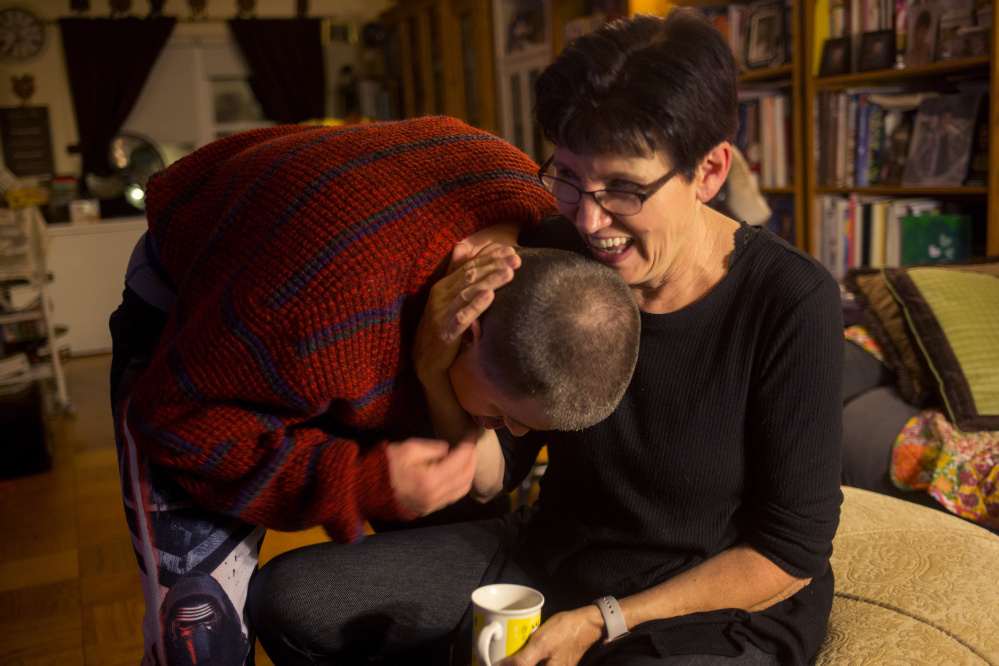
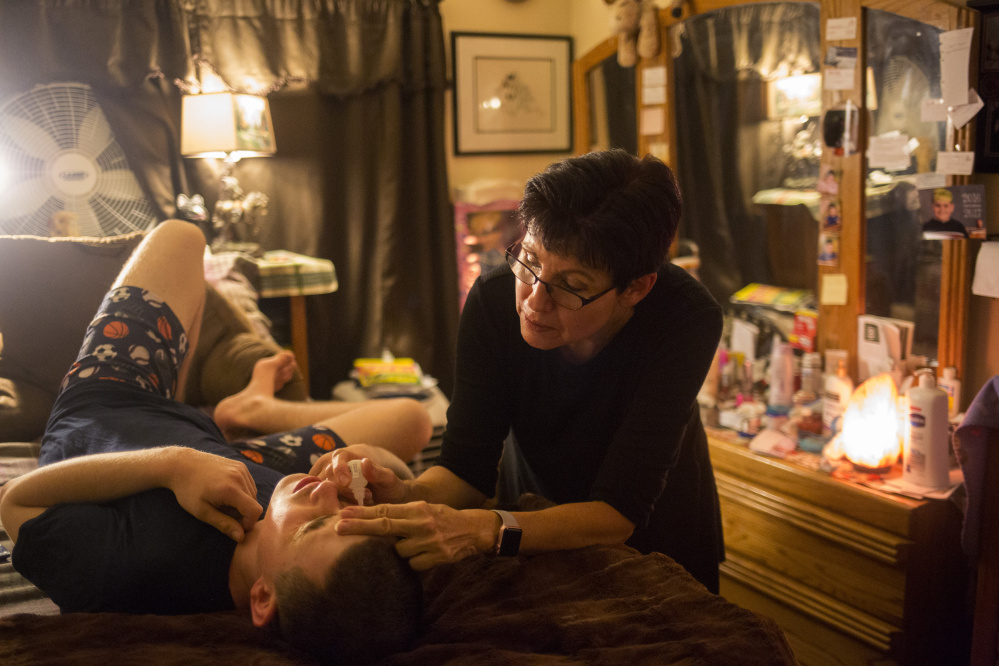
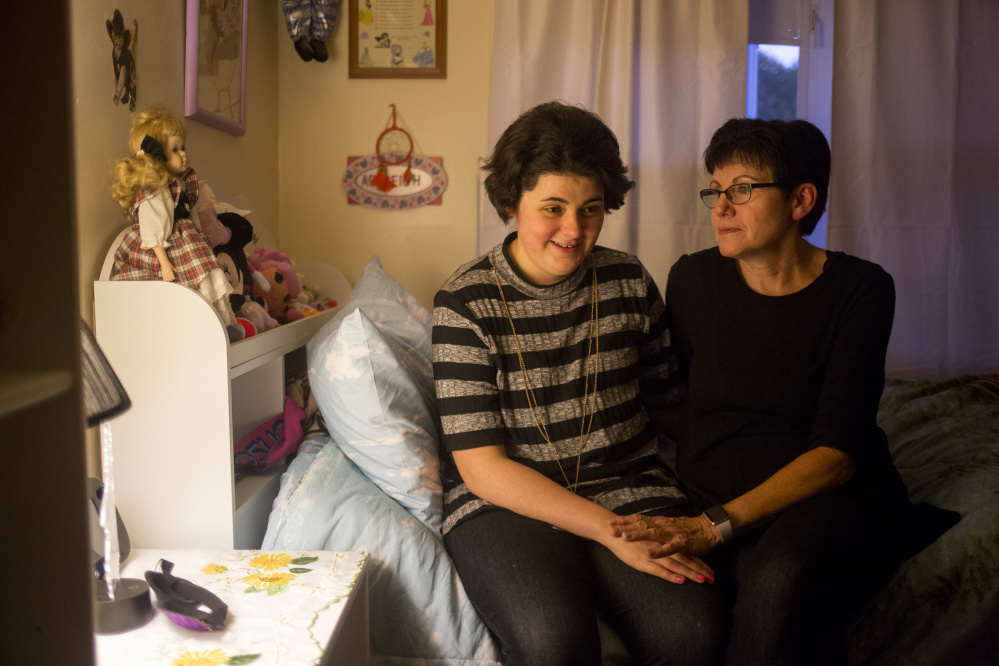
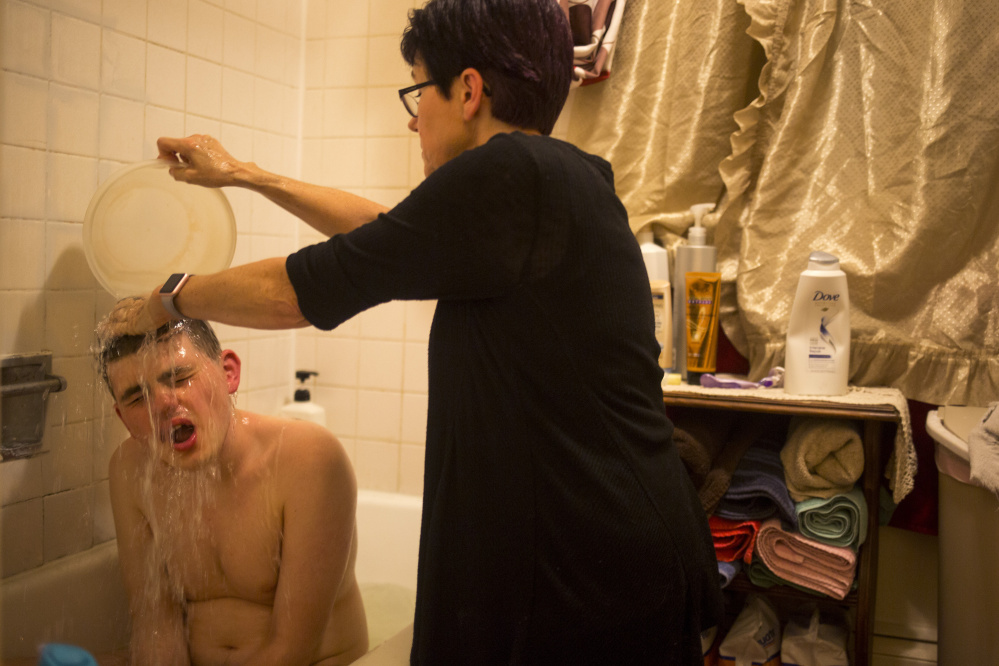
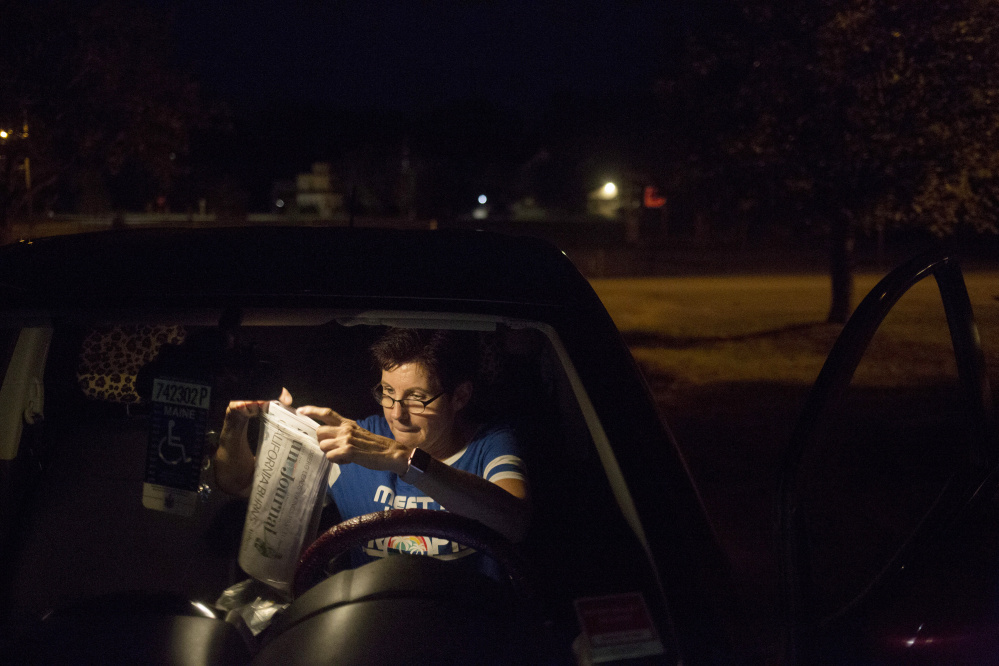
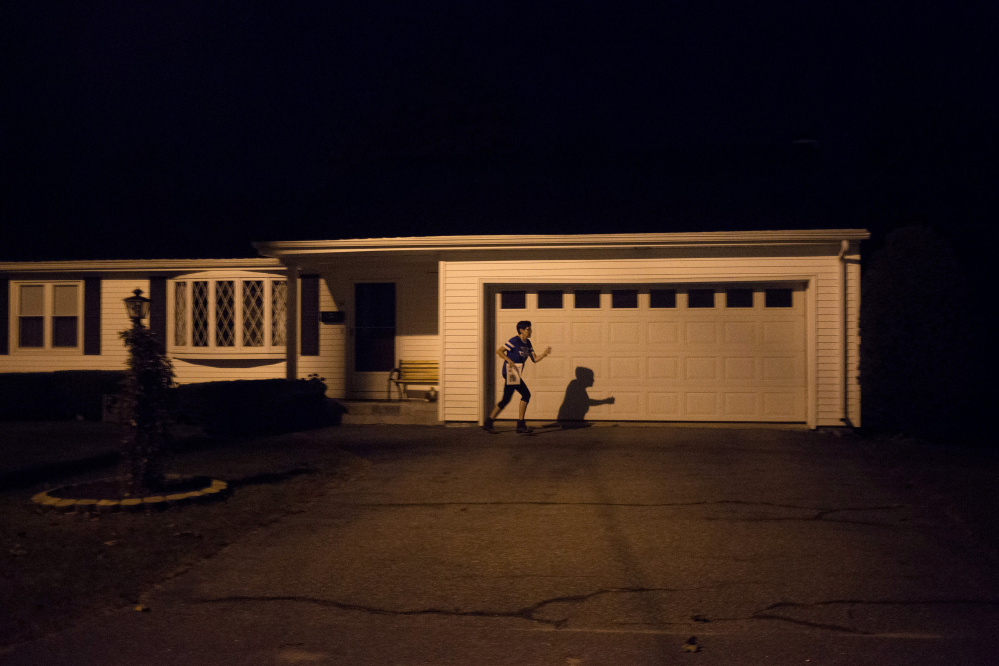
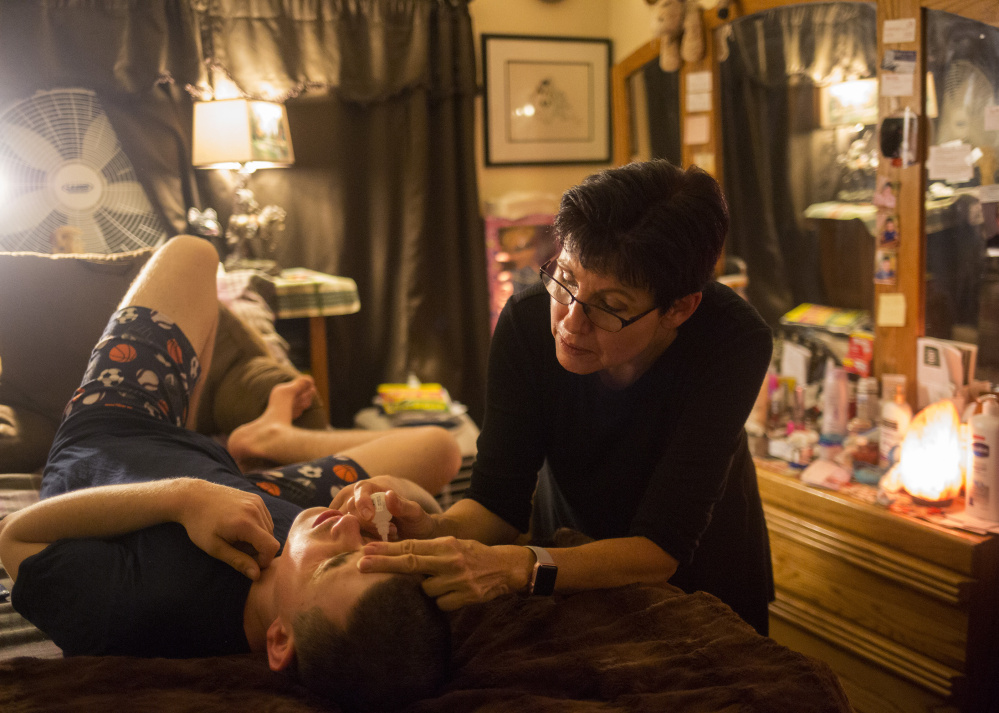
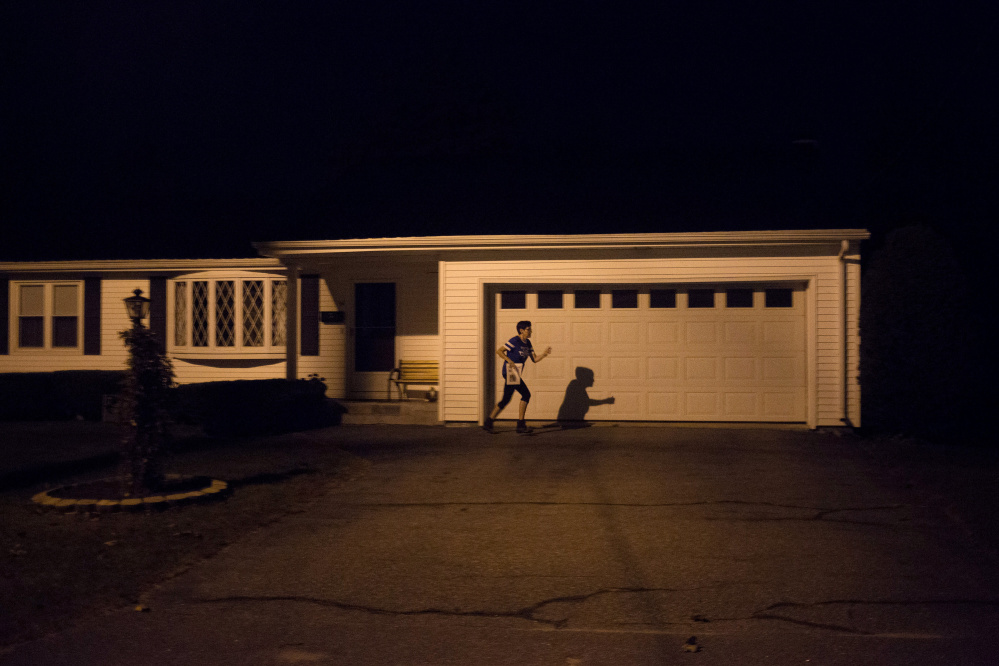
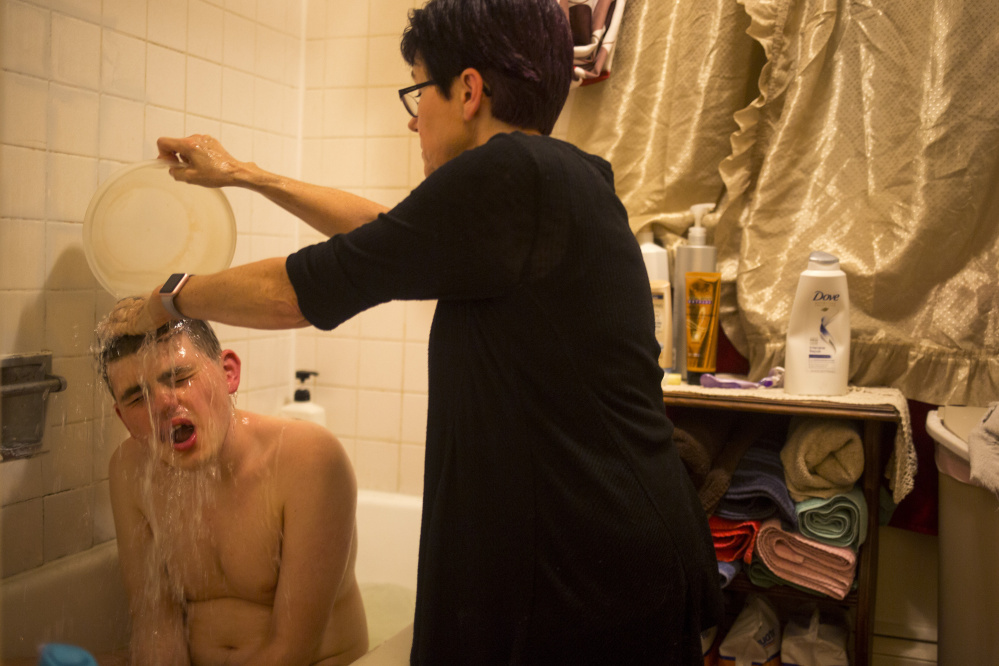

Success. Please wait for the page to reload. If the page does not reload within 5 seconds, please refresh the page.
Enter your email and password to access comments.
Hi, to comment on stories you must . This profile is in addition to your subscription and website login.
Already have a commenting profile? .
Invalid username/password.
Please check your email to confirm and complete your registration.
Only subscribers are eligible to post comments. Please subscribe or login first for digital access. Here’s why.
Use the form below to reset your password. When you've submitted your account email, we will send an email with a reset code.